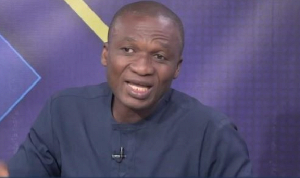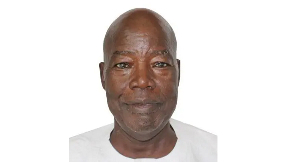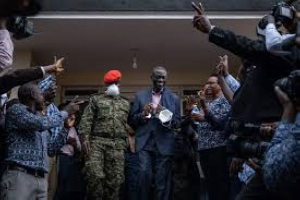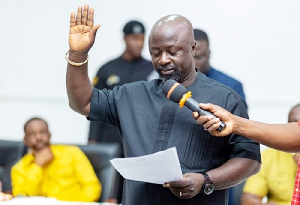In the lead-up to Election 2008, and the desperately stentorian vow among the leading membership of the so-called National Democratic Congress to rain hell and brimstone on Ghana, in the certain likelihood of the party’s resounding defeat, I have been combing my news-files, hoping to clinically appreciate the mass-madness of the only political party in postcolonial Ghanaian history whose membership is protected in their provable and well-documented criminality by the very Fourth-Republican Constitution that is supposed to envisage all Ghanaians as equals before the law.
There is some bizarre phenomenon, or proviso, called an “Indemnity Clause,” curiously etched into Ghana’s Fourth-Republican Constitution which enjoins the people to pretend as if the twenty protracted and sanguinary years during which the clinical assassins and pathological bullies of the so-called Provisional National Democratic Congress (P/NDC) reigned as medieval feudal lords were simply a seasonal picnic in New York City’s Central Park; or, perhaps even more appropriately, a jolly tour of the Kumasi Zoo, perhaps even a celebratory visitation with the children, grandchildren and great-grandchildren of the famous simian of yesteryear, Mr. Joe Blackie. And as if the “Indemnity Clause” were not enough of an insufferable affront to democratic governance and culture, now these same fugitives from justice are vehemently demanding that their victimized and traumatized fellow Ghanaian potential voters return them to the Kangaroo Days of summary sentencing to death by firing squad and the re-institutionalization of the so-called People’s Tribunal.
Needless to say, the latter makes one wonder how a much-touted judicial “genius” (or is it “luminary”?) like Mr. Tsatsu Tsikata, the putative master-mind of the odious People’s Courts and the latter’s Fast-Track adjunct, could muster chutzpah to demand “justice” in a civic court of law.
Interestingly, in the wake of the recent intra-ethnic (actually intra-familial) clashes in the southeastern Ghanaian town of Anloga (some of the initial reports claimed “Angola”), another Tsikata kin, I presume, who initialed himself as “P. Y.,” published an article titled “Govt [sic] Fingered in the Anlo Chieftaincy Dispute” (Ghanaweb.com 11/5/07), in which P. Y. Tsikata caustically accused President J. A. Kufuor, in particular, and the ruling New Patriotic Party (NPP), in general, of seeking to destabilize the 36-town Anlo sub-state in a bid to clinching “the Anlo Parliamentary Seat.” The rather self-righteous writer then proceeded to dress down Ghana’s substantive Chief Executive of State as follows: “It is his good works and respect for the people that can win their hearts. Mr. Kufuor, please go back to the drawing board and rethink your modus operandi. You are a complete disgrace to all peace[-]loving people and you must leave Anlos alone immediately.”
Naturally, I muttered to myself, for several issues vis-à-vis the foregoing intemperate accusations required prompt clarification. First of all, in abruptly demanding of the legitimately elected President Kufuor “to leave Anlos alone immediately,” did the writer imply that since the overwhelming majority of the Anlo electorate had not voted for Mr. Kufuor twice and four years apart, in effect, the substantive Ghanaian premier had absolutely no right to invoke the coercive powers of the State in order to induce peace and calm in any violence-wracked enclave within the geopolitical confines of the country? Or was Mr. P. Y. Tsikata simply declaring that the Anlo traditional state was in the process of seceding from the rest of the country? And if so, on whose mandate was he making such declaration? And would the declarer be prepared to range the military forces of the Anlo State against the presumably illegal Ghanaian occupation forces?
I was also, naturally, intrigued by the novel and quite curious concept of an “Anlo Parliamentary Seat,” one that was exclusively reserved for Ghanaians who could, perhaps, prove their Anlo ethnic identity through DNA evidence, rather than one, as pertains in all true democracies, that is contested on the basis of the candidate’s acceptability to the bulk of the electorate of the Anlo district, or constituency.
Another aspect of Mr. Tsikata’s article that seemed to make perfect sense only to the writer himself, was the rather vacuous assertion that Mr. Kufuor had, somehow, weighed in on the side of Mr. Francis Nyonyo Agboada, also known as Togbui Sri III, an apparently “non-royal” chieftain – forget about the oxymoronic implications – of Anloland, at least in the quite profuse imagination of Mr. Tsikata, who had, nevertheless, been permitted to act as Regent of the vacant Anlo paramountcy for more than a decade. In the end, though, by the stroke of some strange logic, Mr. P. Y. Tsikata decided that the now-installed Togbui Sri III was, after all, not in any way guilty of “non-royal” illegitimacy but rather, it was the Asante-born President Kufuor, “a foreign President of some other Ghana,” who had imperiously presumed to meddle in the internal affairs of the good people of the Anlo State.
On the preceding score, Mr. Tsikata writes: “From all indications, it is now clear that the Anlos are not fighting Nyonyo, but [rather?] the fight is between the NPP government and the people of Anlo.” Earlier, the same writer had observed: “It is in this regard that any foreign influence or interest which is at variance with the long[-]standing traditions of selection and installation of a chief in any part of Ghana is fiercely resisted by the local people of that traditional area [sic]. The bald truth is that we have seen [similar] situation[s] recurred [sic] in many parts of the country in recent times”
What gives the proverbial lie to Mr. Tsikata’s article, as it were, is the glaring historical fact that President Kufuor won both Elections 2000 and 2004 by a landslide, 53-percent to Professor John Evans Atta-Mills of the P/NDC’s approximately 45-percent in 2004 (see “Electoral Commission Declares President Kufuor Winner of Presidential Election” Ghanaweb.com 12/9/04).
Even so, what primarily concerns us here is the NDC’s apparently uncanny flair for sublimating glaring electoral defeat into a poignant and enviable art of self-denial. Thus, for instance, in the wake of Professor Atta-Mills’ blistering defeat in 2004, then-NDC General Secretary Dr. Nii Josiah Aryeh, was to vehemently impugn the integrity of the entire electoral process, on the quite bizarre grounds that the 183,997 ballots, representing 2.14-percent of the national total, that were either spoiled or rejected or both, boggled the rational imagination. Very much so, perhaps, were one to enquire of yours truly. The significant dimension of it all, however, incontrovertibly, squarely and eerily reflected the dismal, but hardly surprising, fact that during its two-decade marathon tenure, the P/NDC had done pretty little to school the average Ghanaian voter on the practical significance of the ballot. For in the swashbuckling lexicon of Chairman Rawlings, the bullet, it was, that reigned supreme.
Consequently, the stentorian nonsense making the rounds regarding Professor Atta-Mills’ camp flatly rejecting the legitimate Diaspora vote, come Election 2008, must be squarely envisaged in the preceding terms. Quite risibly, just the other day, the perennial NDC presidential candidate was bragging about him likely winning the UK votes in Election 2008. Needless to say, the man could readily fool the legendary Ringling Brothers; and I mean, I have absolutely no doubt about this much!

Views expressed by the author(s) do not necessarily reflect those of GhanaHomePage.




![Thomas Partey [L] in a hug with Coach, Mikel Aterta Thomas Partey [L] in a hug with Coach, Mikel Aterta](https://cdn.ghanaweb.com/imagelib/pics/715/71574503.295.jpg)









